Tylenol Lawsuits: Examining Their Role In Consumer Protection And Accountability
- Last Updated: June 12th, 2025

Attorney Jessie Paluch, founder of TruLaw, has over 25 years of experience as a personal injury and mass tort attorney, and previously worked as an international tax attorney at Deloitte. Jessie collaborates with attorneys nationwide — enabling her to share reliable, up-to-date legal information with our readers.
Legally Reviewed
This article has been written and reviewed for legal accuracy and clarity by the team of writers and legal experts at TruLawsuit Info and is as accurate as possible. This content should not be taken as legal advice from an attorney. If you would like to learn more about our owner and experienced injury lawyer, Jessie Paluch, you can do so here.
Fact-Checked
TruLawsuit Info does everything possible to make sure the information in this article is up to date and accurate. If you need specific legal advice about your case, contact our team by using the chat on the bottom of this page. This article should not be taken as advice from an attorney.
Key Takeaways:
- Tylenol lawsuits are actions taken against Johnson & Johnson. They say that using Tylenol during pregnancy may cause autism and ADHD in kids.
- The legal battles make companies address safety issues with their products. This helps protect consumers by making sure they know about potential risks.
- After these lawsuits, many drug makers have made their product labels clearer. They now tell about possible dangers of using acetaminophen while pregnant.
Tylenol Lawsuits: Examining Their Role In Consumer Protection And Accountability
On this page, we’ll discuss the role of safeguarding consumers in Tylenol Lawsuits, an overview of the Tylenol Lawsuits, who qualifies to file a Tylenol Lawsuit, and much more.
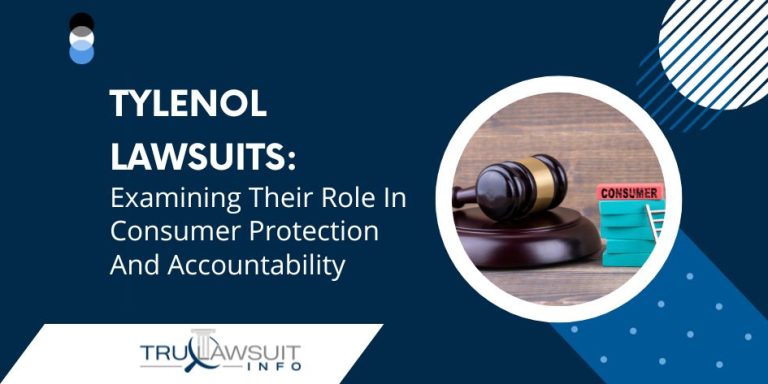
Intro to the Tylenol Lawsuits
Staying safe from harmful side effects of medications is a concern many consumers share.
However, this becomes even more complex when popular over-the-counter drugs like Tylenol face multiple lawsuits.
Through exploring these lawsuits, we aim to shed light on the role they play in consumer protection and holding manufacturers accountable for their products.
Let’s get into fascinating legal battles and understand what they mean for you as a consumer!
Table of Contents
Understanding the Tylenol Lawsuits
These lawsuits are legal actions filed against the makers of Tylenol, with claimants alleging a link between usage of this over-the-counter pain reliever and developmental disorders such as autism and ADHD in children.
What are they and who is involved?
Tylenol lawsuits represent legal actions taken against Johnson & Johnson, the makers of Tylenol.
The focus mainly lies on claims linking prenatal use of Tylenol to developmental disorders in children, such as autism and ADHD.
In these cases, parents who used Tylenol during pregnancy and subsequently had a child diagnosed with either condition become plaintiffs.
These lawsuits have spread across multiple states, adding weight to this ongoing issue involving one of America’s top over-the-counter pain relievers.
Interestingly enough, it isn’t just individual families making their voices heard; they’ve joined forces into a class action lawsuit to fight for justice collectively.
What is the alleged issue with Tylenol?
The alleged issue with Tylenol revolves around the claim that exposure to this drug in-utero could potentially increase the risk of autism and ADHD in children.
These allegations highlight a significant lack of warning labels on Tylenol products detailing these potential risks, especially for pregnant women.
The concern mainly stems from studies suggesting an association between acetaminophen use during pregnancy and higher rates of neurodevelopmental disorders in offspring.
Plaintiffs have argued that manufacturers failed to uphold their duty of care to consumers by not providing sufficient information about these possible dangers.
This failure is seen as a violation of federal law and has resulted in over 100,000 expected lawsuits related to this alleged issue.
As part of these legal proceedings, attorneys need to convince juries about this neglect on the manufacturer’s side while also urging for more comprehensive warnings regarding acetaminophen use during pregnancy.
The Impact of Tylenol Lawsuits on Consumer Protection
Tylenol lawsuits boost consumer protection by holding manufacturers responsible for potential harm from their products, demanding transparency and compelling modifications to make products safer.
How do these lawsuits hold companies accountable for their products?
Lawsuits against manufacturers like Johnson & Johnson, the maker of Tylenol, play a crucial role in corporate accountability.
These legal battles expose alleged wrongdoings and compel companies to address safety issues with their products.
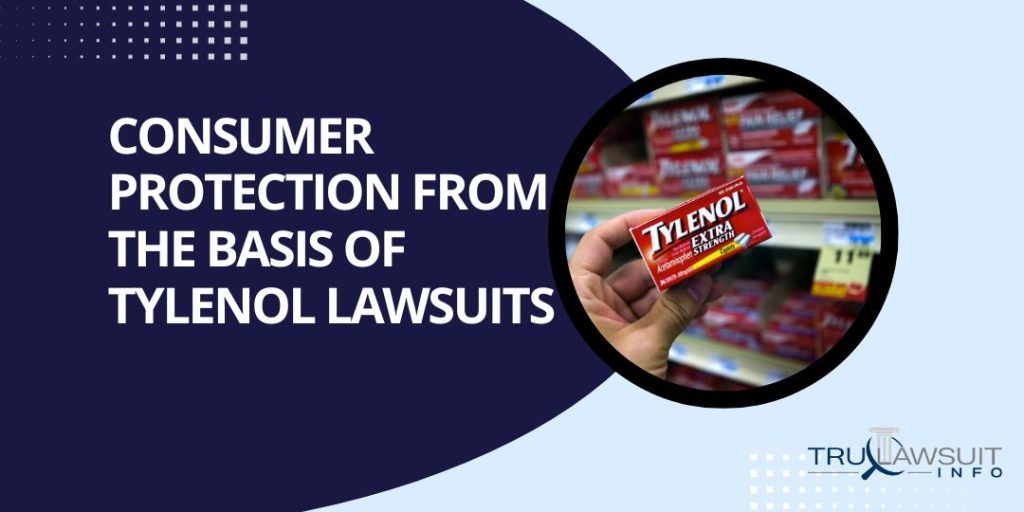
For instance, hundreds of lawsuits have been filed accusing these corporations of failing to adequately warn consumers about potential risks associated with their medications.
As a result, the makers can no longer ignore or downplay these concerns as they risk damaging their reputation and financial health due to litigation costs and settlements.
The lawsuits provide victims an avenue for demanding compensation for damages suffered while pushing the company towards reformative actions such as improving product safety measures or updating warning labels.
This enforced transparency enhances consumer trust by ensuring that corporates are held answerable for any oversights related to product safety.
What changes have been made due to these lawsuits and their outcomes?
Major pharmaceutical companies that manufacture Tylenol are now more accountable for their actions.
From these legal battles, they’ve gleaned valuable insight into the importance of clearly stating potential risks and side effects on product labels.
The Tylenol lawsuits have paved the way for improved transparency in communication to consumers about possible ADHD and autism risks associated with prenatal exposure to acetaminophen, a key ingredient in Tylenol.
Moreover, the number of filed claims has also influenced ongoing scientific research seeking direct links between acetaminophen use during pregnancy and neurodevelopmental disorders in children.
Hence, many changes observed today stem from these lawsuits.
These litigation proceedings have resulted directly in adjustments being made to regulations surrounding how over-the-counter drugs such as Tylenol are packaged and marketed.
More specifically related to our case, some manufacturers are now incorporating warning labels on their products that explicitly state potential dangers of using acetaminophen when pregnant.
The prevalence of filed cases has indeed led regulatory authorities like the Food and Drug Administration (FDA) to pay close attention to consumer safety concerns tied with acetaminophen usage during pregnancy – an element which was previously overlooked by many.
Consequently, thorough investigations into these concerns have been initiated at various levels within health departments across multiple regions.
In addition to driving policy change, these cases continue encouraging ongoing dialogue regarding drug safety – both within industry circles as well as among general public discourse too;
Thereby creating an environment where everyone continues remaining vigilant towards ensuring optimal health safety standards get maintained always while reducing chances anyone may prematurely suffer due any careless oversights or negligence caused by large corporations putting profits ahead patient care factors first instead always.
Examining the Claims Against the Manufacturers
We take a closer look at the allegations against Tylenol manufacturers, questioning the potential link between the drug and neurodevelopmental disorders like ADHD and autism while highlighting key similarities with lawsuits lodged against other products.
Tylenol and ADHD/autism: Is there a link?
Several Tylenol lawsuits allege a possible link between Tylenol use and the onset of ADHD and Autism Spectrum Disorders. Investigations focus on potential exposure to generic acetaminophen, which is present in Tylenol, during pregnancy leading to these neurodevelopmental disorders.
While studies show conflicting results about this alleged connection, multiple cases have been filed asserting that manufacturers were aware of this potential risk but failed to disclose it.
With hundreds of claims under scrutiny, the controversy continues as more evidence comes into play.
This situation underscores the crux of modern consumer protection: ensuring manufacturers are held accountable for their products’ safety and transparency with consumers regarding potential risks.
Similar cases against other products
Here are several manufacturers besides Tylenol have faced legal action due to health-related complaints from consumers:
- Johnson & Johnson: Apart from Tylenol lawsuits, they faced claims for ovarian cancer linked to their talcum powder products.
- Oxycontin: Purdue Pharma, the creator of Oxycontin, faced lawsuits asserting that their aggressive marketing practices downplayed the risk of opioid addiction.
- Valsartan: This commonly prescribed heart medication was at the center of a lawsuit claiming contamination with a cancer-causing chemical.
- Zantac: Sanofi and other manufacturers saw legal troubles when their acid reflux medicine Zantac was found to contain high levels of a carcinogen
Testimonials from Those Affected by Tylenol
Many people have come forward with personal accounts of how Tylenol, a pain relief medication commonly used during pregnancy, had affected their children’s development.
These testimonials provide an insight into the real-life impact of using this drug.
A common thread among these stories is the diagnosis of Autism Spectrum Disorder (ASD) or Attention Deficit Hyperactivity Disorder (ADHD) in children exposed to acetaminophen prenatal exposure.
Parents share heart-wrenching narratives about their child’s struggle with neurodevelopmental disorders, igniting a quest for legal redress and safer consumer practices.
The decision to file a Tylenol lawsuit often stems from these personal experiences and scientific evidence linking fetal exposure to potential neurological risks.
Each account underscores the distress of parents who trusted Tylenol usage during pregnancy only to grapple later with their child’s health challenges that they believe resulted from such use.
These testimonials serve as powerful catalysts for change in federal law and warning labels on drugs like Tylenol.
They bring awareness about unborn children’s vulnerability to substances consumed by pregnant women and ultimately demand accountability from pharmaceutical companies for safe product delivery.
Updates on the Latest Tylenol Autism and ADHD Lawsuits
This section scrutinizes the latest developments in multidistrict litigation involving Tylenol, and examines new studies and evidence about potential links between Tylenol use during pregnancy and increased risks of autism or ADHD in children.
Recent developments in the MDL (multidistrict litigation)
Earlier this year, a significant milestone occurred in the Tylenol Autism and ADHD lawsuit.
The presiding judge over the multidistrict litigation (MDL) denied Johnson & Johnson’s motion to dismiss the case.
With 66 actions currently consolidated in Manhattan federal court, it indicated that these cases hold enough merit to proceed further.
This development has invigorated those involved in the Tylenol lawsuits and breathed new life into their fight for justice.
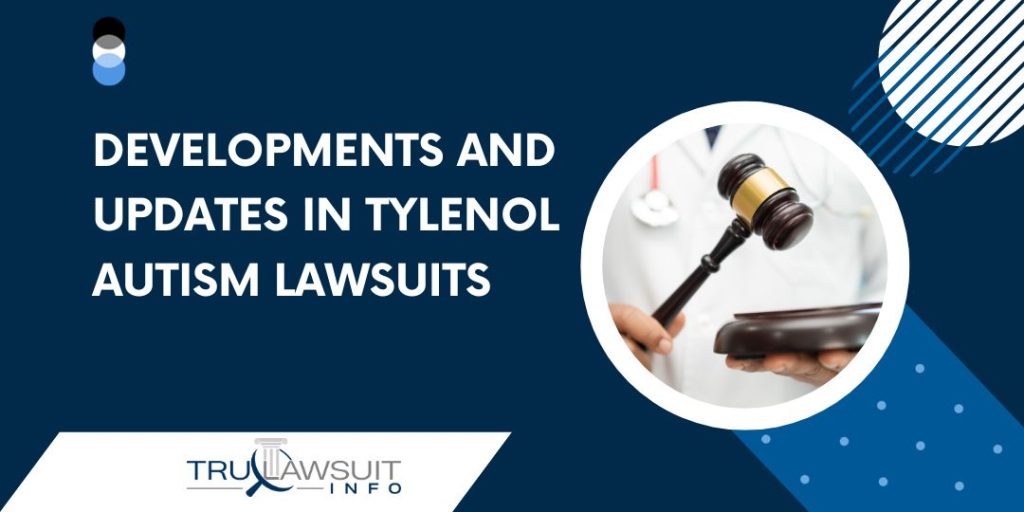
Court documents reveal that more evidence will be presented soon with continuing research on links between prenatal acetaminophen exposure and neurodevelopmental disorders.
New studies and evidence presented
In the scientific community, new research continues to suggest a possible link between prenatal exposure to acetaminophen (Tylenol) and an increased risk of neurodevelopmental disorders such as autism and ADHD.
One notable study published in JAMA Psychiatry investigated umbilical cord blood samples from pregnant women who consumed Tylenol.
The findings revealed higher rates of both conditions among their offspring.
Moreover, substantial evidence is growing outside traditional medical circles. A handful of independent studies have emerged echoing these sentiments, further fueling the debate about Tylenol’s potential risks.
For instance, a groundbreaking investigation conducted by Lawsuit has discovered similar patterns connecting fetal exposure to acetaminophen and an amplified prevalence of cognitive disorders later in life.
The ongoing litigation against Johnson & Johnson – the makers of Tylenol – also brought forth significant scientific evidence supporting these claims during court proceedings.
Court documents reveal that some expert testimonies emphasized the lack of adequate warnings on generic acetaminophen products regarding potential developmental issues associated with in-utero exposure.
These new revelations are stimulating intense discussions around drug safety monitoring systems’ efficacy and pharmaceutical companies’ obligations towards consumers.
As this controversy evolves, it’s safe to predict that future cases will continue relying heavily upon strengthening this newly presented body of evidence.
How to Join a Tylenol Lawsuit
This section will guide readers on the process of joining a Tylenol lawsuit, with information about necessary requirements for filing a valid claim and recommendations for reliable legal partners who can provide expert assistance.
Requirements for filing a claim
Individuals who believe they or their child suffered harm due to Tylenol intake must follow several steps to file a claim.
Firstly, you need to sign and complete health record authorization forms allowing your legal team access to relevant medical records.
An attorney will then review these documents as well as any other pertinent information, like the length of time the product was taken and the diagnosed conditions following use.
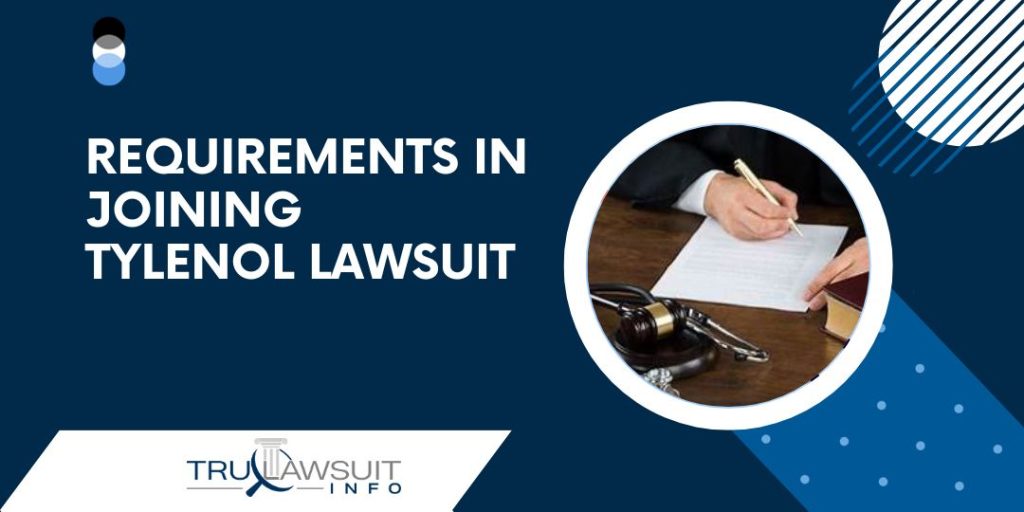
This important step validates if there is sufficient evidence for filing a lawsuit against Tylenol’s manufacturers.
If potential plaintiffs have been diagnosed with neurodevelopmental disorders such as Autism Spectrum Disorder (ASD) or Attention Deficit Hyperactivity Disorder (ADHD), after prenatal exposure to acetaminophen present in Tylenol, they might be eligible for joining a class-action suit in this litigation process.
Trusted legal partners for assistance
Finding a trusted legal partner is crucial for individuals seeking to join a Tylenol lawsuit.
These professionals provide invaluable assistance, navigating the complex aspects of legal proceedings on behalf of those affected.
They step in to decode the intricate language of law and inform claimants about their rights, offering insight into suitable courses of action.
With their help, victims can confidently file claims against Tylenol’s manufacturer if they suspect prenatal exposure led to autism or ADHD diagnosis in their child.
Ultimately, these partners uphold the individual’s best interests and strive towards securing rightful compensation for alleged harm caused by Tylenol use during pregnancy.
Settlements and Other Lawsuits Related to Tylenol
This section delves into the existing settlements and other legal actions filed against Tylenol’s manufacturer, offering a comprehensive overview of the legal landscape surrounding these controversies.
Status of current settlements
Early estimates for the Tylenol autism lawsuits reveal that settlement values are being developed. These calculations are based on a review of cases filed within the last eight months.
The class action lawsuit, representing hundreds of families claiming birth defects related to the drug, continues in federal court.
Legal teams for both sides remain actively engaged in negotiations towards potential resolutions.
However, no firm timeline or final agreement has been announced at present and settlements varies on case-to-case basis.
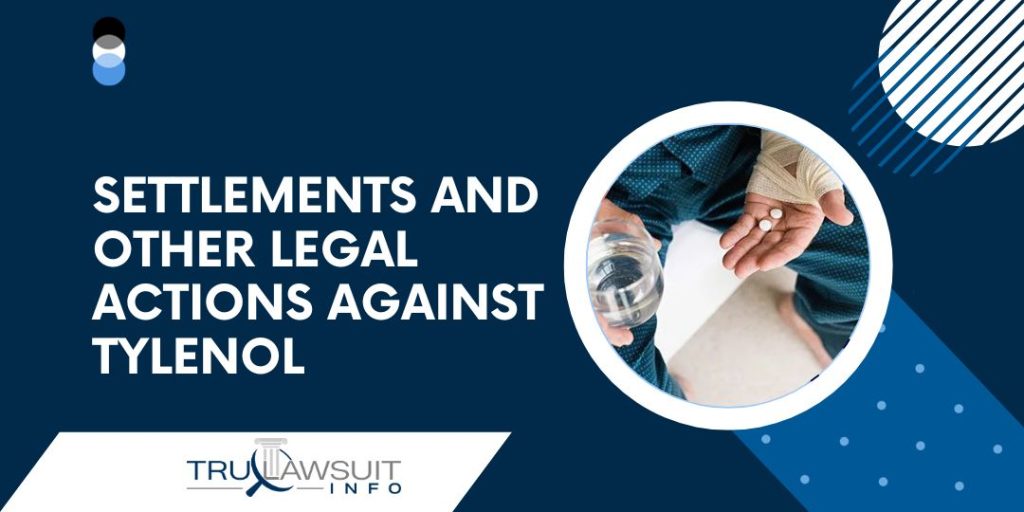
Other lawsuits filed against Tylenol manufacturer
Tylenol’s manufacturer, Johnson & Johnson and various retailers have faced numerous lawsuits over the years.
A large number of these legal battles center around claims that the defendants did not provide adequate warnings about potential risks tied to Tylenol use.
The product liability cases against Tylenol and other acetaminophen manufacturers were combined into a multi-district litigation class, allowing for a more streamlined process.
Some lawsuits specifically allege a link between the use of Tylenol during pregnancy and developmental disorders like autism or ADHD in children.
Parents who used Tylenol while pregnant have initiated an extensive class action lawsuit seeking compensation for possible damages.
In all these suits, plaintiffs chiefly argue that manufacturers, including Johnson & Johnson, failed in their duty to properly warn consumers about the potential health dangers linked with acetaminophen usage.
The Future of Tylenol Lawsuits
As we move forward, new decisions in the courtrooms are set to shape the future of Tylenol lawsuits, with potential implications on drug labeling and warnings for consumer safety.
Upcoming hearings and decisions for Tylenol Lawsuit
The Tylenol autism lawsuit is progressing swiftly, with new hearings on the horizon.
The judicial community and the general public are closely monitoring these proceedings as Judge Cote’s decision could lead to major changes in drug labeling laws to get Tylenol Autism Claims with the help of Tylenol autism lawyers.
As the case enters its next phase, more than 100,000 victims are expected to join the litigation.
It’s important to note that no final ruling has been made yet.
Future court dates can play a significant role in determining whether or not acetaminophen labels will include warnings about potential risks for autism and ADHD.
These decisions carry immense weight as they might set precedents for other similar cases moving forward.
Potential impact on drug labeling and warnings
Legal battles surrounding Tylenol may lead to substantial changes in drug labeling and warnings.
Regulatory authorities like the FDA could require manufacturers to include specific notifications about potential risks of developmental disorders connected with prenatal acetaminophen exposure.
The inclusion of such warnings on labels can effectively increase consumer awareness, leading to informed decision-making when choosing over-the-counter medications.
Critics argue that this shift in policy is overdue as studies have repeatedly suggested a link between prenatal acetaminophen use and the development of autism spectrum disorder.
The change will not only impact Tylenol but also generic equivalents sharing similar compositions.
This vast reach makes it all more significant for companies, regulators, and consumers alike—underlining the gravity of lawsuits like these beyond individual cases.
Conclusion
The unfolding Tylenol Acetaminophen autism lawsuits continue to reshape the landscape of consumer protection and company accountability in pharmaceutical practice.
These legal actions spotlight the importance of transparency about potential risks like Neurodevelopmental disorders associated with medications.
As proceedings progress, drug manufacturers may need to reconsider the adequacy of their product warnings and take additional steps for consumer safety.
Through such lawsuits Tylenol autism MDL, consumers gain a more empowered stance in holding corporations accountable for their health and wellbeing.
Frequently Asked Questions
-
What is the Reason Behind Tylenol Autism Lawsuits?
Tylenol autism lawsuits are filed by families claiming that taking Tylenol during pregnancy may have contributed to their child’s Autism Spectrum Disorder (ASD) or Attention Deficit Hyperactivity Disorder (ADHD) diagnosis.
-
How Does Filing a Tylenol Autism Claim Work?
Families with an ASD or ADHD diagnosed child, who suspect a link to acetaminophen use during pregnancy, can file a Tylenol autism claim with the aid of specialized lawyers.
-
What Type of Evidence Supports These Allegations in a Potential Tylenol Autism lawsuit?
Researchers found out potentially harmful effects on fetal brain development due to intake of acetaminophen during pregnancy which forms substantial grounds for these cases.
-
Are there Specific Law Firms Specializing in this Kind of Litigation?
Yes, there are law firms where specialized Tylenol lawyers handle specifically Tylenols autism ADHD lawsuit and other similar Acetaminophen lawsuits
-
Have Any Settlements Been Reached in Tylenol Autism Litigation?
The details about settlement amounts vary per case and often remain confidential but some information might be accessible through public records or court documents from the southern district of New York or other relevant jurisdictions.

Experienced Attorney & Legal SaaS CEO
With over 25 years of legal experience, Jessie is an Illinois lawyer, a CPA, and a mother of three. She spent the first decade of her career working as an international tax attorney at Deloitte.
In 2009, Jessie co-founded her own law firm with her husband – which has scaled to over 30 employees since its conception.
In 2016, Jessie founded TruLaw, which allows her to collaborate with attorneys and legal experts across the United States on a daily basis. This hypervaluable network of experts is what enables her to share reliable legal information with her readers!
Have A Case?
Here, at Tru Lawsuit Info, we’re committed to helping victims get the justice they deserve.
To do this, we actively work to connect them with attorneys who are experts in litigating cases similar to theirs.
Would you like our help?
Tru Lawsuit Info is a reliable source of information about issues that may affect your health and safety, such as faulty products, data breaches, and environmental hazards.
Our team of experienced writers collaborates with medical professionals, lawyers, and advocates to produce informative articles, guides, and other resources that raise awareness of these topics.
Our thorough research provides consumers with access to reliable information and updates on lawsuits happening around the country. We also can connect consumers with attorneys if they need assistance.
Camp Lejeune's water contamination issue spanned several decades starting in the 1950s. Exposure to these chemicals has been linked to various serious health issues, including cancer, organ diseases, and death.
Research is increasingly suggesting a link between the use of Tylenol during pregnancy and the development of neurodevelopmental disorders, such as autism and ADHD, in infants.
Legal action is being taken against manufacturers of Aqueous Film-Forming Foam (AFFF), a chemical used in fighting fires. The plaintiffs allege that exposure to the foam caused health issues such as cancer, organ damage, and birth and fertility issues.
Have A Case?
Here, at Tru Lawsuit Info, we’re committed to helping victims get the justice they deserve.
To do this, we actively work to connect them with attorneys who are experts in litigating cases similar to theirs.
Would you like our help?







